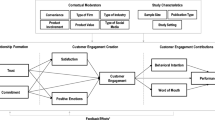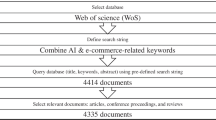Abstract
Recent research has identified two aspects of the need to evaluate (NE) that are focused on interpersonal contexts: NE-expressing and NE-learning. Given that online word of mouth (WOM) is inherently interpersonal, we explore whether these two scales can predict consumers’ likelihood of creating and seeking online WOM. We find that high NE-expressing does not always lead to a greater likelihood of sharing WOM. Although it does so for familiar products, for novel products, a basic level of knowledge must precede consumers’ willingness to engage in WOM, such that consumers are most likely to write reviews when high on both scales. We also show that consumers with high NE-learning are more likely to seek recommendations in anonymous online forums. However, on identity-linked platforms, consumers higher in NE-expressing are more motivated to seek recommendations even when NE-learning is relatively low because identity-linkage makes even a request for information an opportunity for self-expression. These results have important implications for marketers who wish to understand the psychological drivers of online WOM.




Similar content being viewed by others
Data availability
To adhere to the data policy, we have deposited the data here: https://osf.io/hzs93/.
Notes
One notable exception is work by Cheema and Kaikati (2010), who explored the role of need for uniqueness; those who are high in this trait are less willing to generate positive WOM for publicly consumed products that they own.
We asked participants to recall a positive product to ensure they were familiar enough to have formed a favorable opinion. The positive effect of NE-expressing and mavenism remained significant (ps = .017 and < .01, respectively) in an analysis with all participants.
The NE-expressing finding was replicated in a study with undergraduates (see web appendix).
The order of presentation of the two scales did not moderate the key effect (p = .49).
This finding was replicated in a direct replication using a different sample of MTurk workers reported in the web appendix.
This interaction remained significant when controlling for participants’ attitudes toward the water bottle (p = .04; also replicated using a different sample reported in the web appendix).
In the novel condition in study 2, the impact of NE-learning on review writing was stronger (more positive slope) when NE-expressing was high, the same pattern as in study 3. However, in study 2, the positive impact of NE-learning on review writing when NE-expressing is high becomes flat when NE-expressing is low. Importantly, once the main effects of the two scales are removed (see Rosnow and Rosenthal 1989), these interactions are of the same form (Petty et al., 1996). They both show that NE-learning becomes more predictive of providing novel product reviews as NE-expressing increases. Or conversely, NE-expressing becomes more predictive of providing novel product reviews as NE-learning increases.
We randomized whether participants respond to the NE scales before or after the manipulation and dependent measures in study 4 and in a replication of study 2 (presented in the web appendix). The order of presentation did not moderate the key effect (p = .44 and .18, respectively).
To examine if those high in NE-expressing, not NE-learning, were driven by the motive to tell others they were going on a trip, we conducted additional analysis with a motive measure (see web appendix).
References
Berger, J. (2014). Word of mouth and interpersonal communication: A review and directions for future research. Journal of Consumer Psychology, 24(4), 586–607. https://doi.org/10.1016/j.jcps.2014.05.002
Berger, J., & Iyengar, R. (2013). Communication channels and word of mouth: How the medium shapes the message. Journal of Consumer Research, 40(3), 567–579. https://doi.org/10.1086/671345
Berger, J., & Schwartz, E. M. (2011). What drives immediate and ongoing word of mouth? Journal of Marketing Research, 48(5), 869–880. https://doi.org/10.1509/jmkr.48.5.869
Brown, T. J., Barry, T. E., Dacin, P. A., & Gunst, R. F. (2005). Spreading the word: Investigating antecedents of consumers’ positive word-of-mouth intentions and behaviors in a retailing context. Journal of the Academy of Marketing Science, 33(2), 123–138. https://doi.org/10.1177/0092070304268417
Cheema, A., & Kaikati, A. M. (2010). The effect of need for uniqueness on word of mouth. Journal of Marketing Research, 47(3), 553–563. https://doi.org/10.1509/jmkr.47.3.553
Chen, Z. (2017). Social acceptance and word of mouth: How the motive to belong leads to divergent WOM with strangers and friends. Journal of Consumer Research, 44(3), 613–632. https://doi.org/10.1093/jcr/ucx055
Chen, Z., & Berger, J. (2013). When, why, and how controversy causes conversation. Journal of Consumer Research, 40(3), 580–593. https://doi.org/10.1086/671465
Eisingerich, A. B., Chun, H. H., Liu, Y., Jia, H., & Bell, S. J. (2015). Why recommend a brand face-to-face but not on Facebook? How word-of-mouth on online social sites differs from traditional word-of-mouth. Journal of Consumer Psychology, 25(1), 120–128. https://doi.org/10.1016/j.jcps.2014.05.004
Feick, L. F., & Price, L. L. (1987). The market maven: A diffuser of marketplace information. Journal of Marketing, 83–97. https://doi.org/10.1177/002224298705100107
Godes, D., & Mayzlin, D. (2009). Firm-created word-of-mouth communication: Evidence from a field test. Marketing Science, 28(4), 721–739. https://doi.org/10.1287/mksc.1080.0444
He, D., Melumad, S., & Pham, M. T. (2019). The pleasure of assessing and expressing our likes and dislikes. Journal of Consumer Research, 46(3), 545–563. https://doi.org/10.1093/jcr/ucy079
Jarvis, W. B. G., & Petty, R. E. (1996). The need to evaluate. Journal of Personality and Social Psychology, 70(1), 172–194. https://doi.org/10.1037/0022-3514.70.1.172
Katz, D. (1960). The functional approach to the study of attitudes. Public Opinion Quarterly, 24(2), 163–204. https://doi.org/10.1086/266945
Moldovan, S., Goldenberg, J., & Chattopadhyay, A. (2011). The different roles of product originality and usefulness in generating word-of-mouth. International Journal of Research in Marketing, 28(2), 109–119. https://doi.org/10.1016/j.ijresmar.2010.11.003
Petty, R. E., Fabrigar, L. R., Wegener, D. T., & Priester, J. R. (1996). Understanding data when interactions are present or hypothesized. Psychological Science, 7(4), 247–252. https://doi.org/10.1111/j.1467-9280.1996.tb00368.x
Rosario, A. B., Sotgiu, F., De Valck, K., & Bijmolt, T. H. (2016). The effect of electronic word of mouth on sales: A meta-analytic review of platform, product, and metric factors. Journal of Marketing Research, 53(3), 297–318. https://doi.org/10.1007/s11747-019-00706-1
Rosnow, R. L., & Rosenthal, R. (1989). Definition and interpretation of interaction effects. Psychological Bulletin, 105(1), 143–146. https://doi.org/10.1037/0033-2909.105.1.143
Spiller, S. A., Fitzsimons, G. J., Lynch, J. G., Jr., & McClelland, G. H. (2013). Spotlights, floodlights, and the magic number zero: Simple effects tests in moderated regression. Journal of Marketing Research, 50(2), 277–288. https://doi.org/10.1509/jmr.12.0420
Xu, M., Petty, R. E., Wright, N., & Briñol, P. (2021). Individual differences in three aspects of evaluation: The motives to have, learn, and express attitudes. Journal of Personality and Social Psychology, 121(2), 257–284. https://doi.org/10.1037/pspa0000279
Author information
Authors and Affiliations
Corresponding author
Ethics declarations
All data collection processes complied with the ethical standards and all participants consented to participate in our studies.
Conflict of interest
The authors declare no competing interests.
Additional information
Publisher's note
Springer Nature remains neutral with regard to jurisdictional claims in published maps and institutional affiliations.
Rights and permissions
Springer Nature or its licensor (e.g. a society or other partner) holds exclusive rights to this article under a publishing agreement with the author(s) or other rightsholder(s); author self-archiving of the accepted manuscript version of this article is solely governed by the terms of such publishing agreement and applicable law.
About this article
Cite this article
Xu, M., Reczek, R.W. & Petty, R.E. Need to evaluate as a predictor of creating and seeking online word of mouth. Mark Lett 34, 697–712 (2023). https://doi.org/10.1007/s11002-023-09676-5
Accepted:
Published:
Issue Date:
DOI: https://doi.org/10.1007/s11002-023-09676-5




